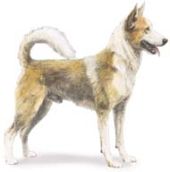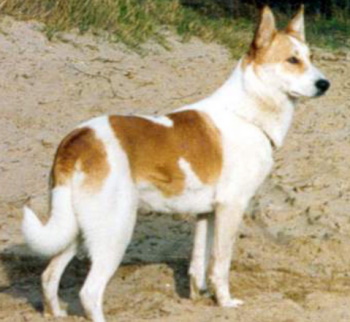Canaan Dog Breed
Was He Queen Jezebel's Companion?
The Canaan dog breed, also known as Kelev K'naani, Israel Canaan Dog, Bedouin Sheep dog and Palestinian Pariah Dog is widely recognized as the national dog of Israel and has been known in the middle east for centuries.
Depictions of their likeness have been discovered in caves at Beni-Hassan, on the east bank of the Nile, dating them to 2200-2000 BC.
TABLE OF CONTENTS
While the Canaan is a descendant of wild Pariah Dogs, many dogs from this group became partially domesticated in very early times by protecting and working as flock guardians and herders to nomadic tribes, such as the Bedouins.
Background Of The Canaan Dog
Austrian-born Dr. Rudolphina Menzel, a noted dog cynologist who relocated to Israel in 1938, is largely credited with the development of the Canaan dog breed in the early 20th century.
The State of Israel's foundation was being laid down at that time and the Haganah requested Menzel to develop a dog to patrol and guard their isolated settlements.
Being an ardent admirer of the semi-wild Pariah dogs, Dr. Menzel decided that the wild Pariah dogs were the ideal base stock, finding them both easy to domesticate and highly intelligent. Over a six month period, she collected a select group of them to breed and train.
What resulted was the Canaan dog breed we know today.
Subsequently, the breed was also used by the Israeli Defense Forces for various tasks, including mine detection in times of war, and search-and-rescue missions.
An interesting legend about the Canaan dog suggests that this breed was tethered to the throne of Queen Jezebel by a golden chain.
The Canaans' abilities have earned them recognition in conformation, herding, tracking, obedience and agility.
The first official standard for the Canaan Dog was written by Dr. Menzel in 1960.
The breed was first recognized by the Israel Kennel Club in 1953, the FCI (Federation Cynologique Internationale) in 1966., and the UK Kennel Club in 1970.
The Canaan was officially recognized by the The American Kennel Club (AKC) in 1997 and assigned to the herding dog breeds group.
Characteristics of the Canaan Dog

The Canaan dog is a very good family companion. He is cautious and reserved around strangers - a carry-over from his feral beginnings when he had to be ever vigilant of his surroundings. But as a family companion he is extremely loving and loyal.
His hearing and scenting abilities are fantastic and this coupled with a very alert disposition, makes him an excellent and protective watchdog.
However because of his natural reserve and suspicious nature, it is important to thoroughly socialize your Canaan from an early age, to help him learn how to recognize and evaluate various situations, people and other dogs.
Canaan dogs are very intelligent and train easily if the right approach is used. Owners report that harshness will get you nowhere! On the other hand, motivation in the form of praise or treats as rewards, works wonders and will help your dog remember his lessons much better.
Another tip is to keep training sessions short and as creative as possible, so as not to bore this smart dog. But the "biggie" in the training department, is getting your dog's respect as his pack leader and showing confidence when working with him.
House training generally takes less time to accomplish with this breed because he has stronger ties to the "den" mentality and is more naturally clean.

Appearance And Care
Height: 19-24 inches.
Ideal standard weight: 35-55 lbs.
Colors: Sand to red-brown, white and black, with or without masks. Lifespan: Up to fifteen years with good care
The Canaan dog breed is of medium size, well-proportioned and squarely built. He has an athletic appearance which compliments his characteristic sharp fast trot.
His head is wedge-shaped with erect low set ears and a smooth coat that finishes with a bushy tail.
The Canaan has a flat lying double coat that is medium short, and straight. The tail is
bushy and curls over the back. Shedding is bit more than average and quite heavy during seasonal blowing of the coat.
Weekly brushing and combing will take care of maintenance, along with the regular attention to ears, nails as well as frequent brushing of teeth - daily if possible.
An excellent coat grooming tool, that gets high praise from dog owners for removing loose hair, is the FURminator DeShedding Tool.
Health Of The Canaan Dog Breed
The Canaan dog breed is considered a healthy dog, but can be subject to a few issues common to most dog breeds such as:
- Hip Dysplasia - A genetic joint disease that results from the malformation of the hips and is characterized by joint weakness, stiffness, and pain caused. Depending on the severity of the condition, a veterinarian may advise pain medication or surgery.
- Elbow Dysplasia -
A common cause of front leg lameness. More specifically, an abnormal development of the elbow joint in young, large, rapidly
growing dogs. Signs of elbow dysplasia appear in puppies 4 to 10 months of age.
- Progressive Retinal Atrophy (PRA) - An inherited condition that gradually leads to vision loss. This disease affects the retina, leading to degeneration of the retinal cells, ultimately resulting in blindness.
- Patella Luxation aka Slipping Kneecap - As the name implies, this involves a dislocation of the kneecap to varying degrees and is usually an inherited defect and more common in toy or smaller breeds. Responsible breeders will screen more than one generation of parents for this condition, before breeding, as well as the resulting puppies, before they are offered for purchase. An early sign of Patella Luxation is limping.
The Canaan Dog Club of America recommends the following tests be completed for a health evaluation:
- Hip Evaluation
- Elbow Evaluation
- Thyroid Evaluation
- Ophthalmologist Evaluation
- Patella Evaluation
Responsible breeders should provide health information of the parents available when puppies are being offered for sale.
How Active is the Canaan Dog
The Canaan does not require an excessive amount of exercise, but he does need regular daily walks to maintain good health of mind and body.
Joggers would find the Canaan an ideal running mate as he does like to trot rather than walk and does so at a fast pace. Plus, he has a lot of stamina and doesn't tire easily.
In addition, a dog with some former feral traits, will definitely appreciate an opportunity to play and run freely if a safe area is available to do this.
Next best thing would at least be a yard where the Canaan can be involved in games to challenge his intelligence.
Canaans have done well in the competitive areas of tracking and agility, so this is something else you might want to consider to take advantage of his athletic talents, as well as for his enjoyment.
Ideal Living Space
Ideally, while this breed is very adaptable, he is best suited to a house with significant yard space.
While Canaans are not generally characterized as "barkers", some can be, particularly when guarding their territory, so this should be taken into consideration if neighbors are close by.
The Canaan is very athletic and a yard is great for outdoor play, training and the usual dog business.
The Canaan With Children?
When raised with children and other pets, the Canaan Dog has a good reputation and is considered a gentle companion.
However, it is still always the best policy in our view to have an adult supervise activities between pets and children.
Senior Or Less Active Families?
The devoted and loyal nature of this dog, would make it a good companion and protector for senior or more sedentary families as long as regular exercise can be provided.
FAQs about Canaan Dogs
Are Canaan Dogs good family pets?
Yes, Canaan Dogs are excellent family pets for active households. They are loyal, intelligent, and protective, making them good companions for children and adults.
How much exercise does a Canaan Dog need?
Canaan Dogs require at least 1–2 hours of exercise each day, including both physical activities and mental stimulation.
Do Canaan Dogs shed a lot?
Yes, Canaan Dogs shed moderately year-round, with increased shedding during seasonal changes. Regular brushing will help manage shedding.
Are Canaan Dogs easy to train?
While Canaan Dogs are intelligent, they can also be independent and somewhat stubborn, so training requires patience and consistency. Positive reinforcement works best.
How long do Canaan Dogs live?
Canaan Dogs typically live between 12 to 15 years, with proper care and regular vet checkups.
Are Canaan Dogs prone to health problems?
Like all breeds, Canaan Dogs can be susceptible to conditions like hip dysplasia, hypothyroidism, and progressive retinal atrophy (PRA), but they are generally a healthy breed.
Do Canaan Dogs get along with other pets?
Canaan Dogs are typically good with other pets, especially if they are raised together. However, they may have a high prey drive, so caution is needed around small animals.
Before You Go...
If you like the content of this page, as well as others on my site, please give it some love by clicking on the heart in the lower right hand corner. This helps me to keep providing enjoyable and useful content.
Thank you.

